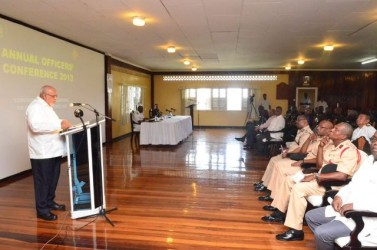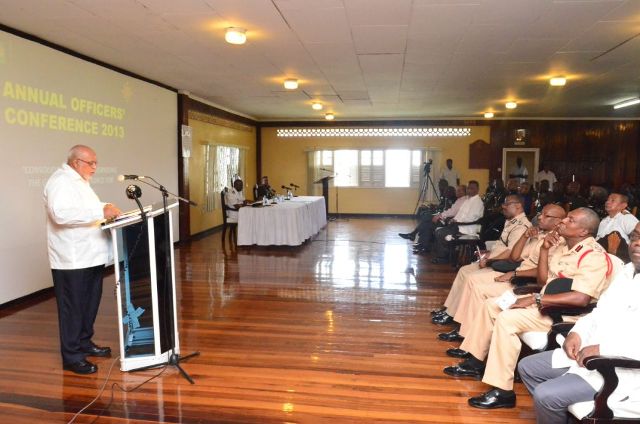Commander-in-Chief of the armed forces, President Donald Ramotar yesterday reminded officers of the Guyana Defence Force that as leaders they have many responsibilities one of which is to serve as examples to ranks and to “lift and uphold the image of the army in the country as a whole.”
In an address that made no direct reference to the recent robbery of miners, allegedly by soldiers and an officer, the President said the army is one of the country’s most important institutions and its members must “embrace and adhere to the dignity and professionalism of the officer corps.”

The President, who gave what could be considered a sneak preview of the upcoming budget, stressed that the role of the military in the security cannot be overemphasized. Since the military chairs the joint services, it is important to ensure that “the image of the GDF as the premier security institution is not just preserved but is enhanced,” he added. To this end, it is important that public confidence in the army be maintained and upheld.
The opening session of the two-day conference at Camp Ayanganna yesterday under the theme ‘Consolidating and Modernising the Guyana Defence Force’ was also addressed by Chief of Staff, Commodore Gary Best. He, too, shied away from the recent mining incident.
Ramotar focused most of his speech on the global economic crisis and the armed conflicts which are having great impact beyond the borders of the countries involved. He said the negative consequences from such an environment are affecting countries the world over as they increase the list of international crises. High on that list is narco-trafficking, which he said was considered to be one of the more serious global problems of all time. The list also includes money laundering, financing of terrorism and trafficking in arms, which gives rise to gun crimes.
He reminded the officers that the protection of national security is no longer confined to the country’s frontiers, but in the changing times “that we live in other matters have surfaced that threaten our security.”
While Guyana has friendly relations with all of its neighbours, he however admonished that the country could not relax on securing its borders and it must develop its security apparatus to also deal with other national security issues.
“Clearly an officer of the Guyana Defence Force must have a deeper understanding of the problems and the challenges we have to deal with,” the president said, adding that they have to constantly work to ensure that officers and soldiers are highly trained professionals capable of applying modern technology in their work. He said trained professionals in the armed forces would not only make great contributions to these institutions but to the society at large when they leave.
According to the president, an important objective for the security services is to ensure that the environment of economic activities and protection of the country’s economic gains are given the highest priority. He pointed out that the natural resources sector was making increasingly large contributions to the economy and welfare of the country.
“It therefore demands heightened security and attention,” he said pointing out that every sector of the force has a role to play. Among these is exerting greater command and control of the country’s waterways so as to ensure that the fishermen will have a greater sense of security.
The president also implored the GDF to take care of the assets that are put at its disposal and urged officers to look at the Auditor General’s report on the military “and see the great room you have for improving the use of our scarce resources.
“Many of the very expensive equipment including boats, aircraft, vehicles, many of them have too long down time periods and other equipment are not always being used at [their] best. That must be improved greatly and there is room for better management of these resources,” the president said.
Budget
Moving away from the force, Ramotar said that in the upcoming budget a number of new initiatives would be included that could see recruitment and manpower agencies with a mandate to actively reach out to job seekers and employers. Industrial training and apprenticeship programmes to improve efficiency in the market for skilled and unskilled labour will also be expanded.
He said the National Insurance Scheme (NIS) will also be looked at with the aim of improving compliance, administrative strengthening and increased coverage as a means of improving its financial status and effectiveness. However, he said this would not substitute for the reforms that will emerge from the consultations that are currently ongoing on the actuarial report.
He also referred to the young professionals’ housing programme that will include special land development schemes, access to financing through partnership and extension services such as construction advisory support.
The budget can also include the developing of online degree programmes by the University of Guyana, which the President said will help to make tertiary education more broadly available and increase the income of the university.
Further, the head of state said that the budget will also make way for the launching of a fertilizer and planting facility to assist in boosting food production and strengthening food security. The revamping of the sugar industry transformation programme will also find its way into the budget along with the strengthening of the programme to equip youths with entrepreneurial skills and the development of a programme to create employment for Amerindian youths through apprenticeships and promoting entrepreneurial skills.
Ramotar hinted at a Guyanese Diaspora sabbatical, looking at fiscal incentives for remigrants and the expansion of the Diaspora housing programme.
He also referred to: “Work on a programme to improve the efficiency of the public sector that interacts with the public with a view of reducing bureaucratic delays… We would work towards reducing (the) time line for service delivery.”
Tax reform to improve economic growth and broadening tax payments will also be addressed along with developing and improvement sport facilities and infrastructure.
‘Prioritizing’
Meanwhile, speaking at his sixth and probably last conference—as he is set to retire later this year—Best said that since Guyana does not face any imminent threat of armed aggression the GDF in prioritizing its defence and security mission has begun to focus “more on missions relating to defending national independence and guaranteeing normal functioning of institutions.”
He said while the defence and security architecture continues to be anchored in the preservation of the country’s sovereignty and integrity, “the current national and foreseeable threat [to] institutional functionality and security of our domestic space is now a priority.”
Saying that there is need for “new missions” for the force, Best said the force also needed to modernise its thinking, strategy and systems. According to him, the force’s strategic defence review recommended missions that encompass providing a stable environment conducive to economic and social development in the country. Also, it includes reducing the risks of natural disasters. For the new missions to be successful, Best said, an increase in resources was critical along with the repositioning of the force’s interior locations.
“No amount of sophisticated equipment [will make us] a more professional progressive defence force,” he said. According to the head of the GDF the preliminary finding of the force’s strategic defence review that has been submitted to the defence board also points to the need for the force to be more strategic, adaptable and well coordinated in the way it advances its interest and protects national security.
Enhanced coordination with civil society was therefore critical to the force achieving its national security priority and he said he intends for the GDF to deepen its relationship with such agencies.
He added that the review also highlighted that the country’s development environment is defined by a number of progressive industries which include mining, construction, low carbon development and integrated technology.

